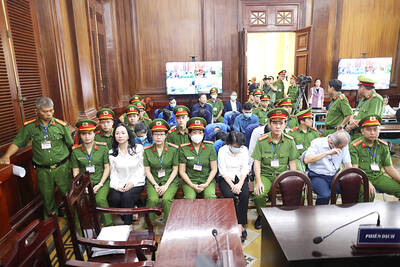The densely populated Gaza Strip has long lacked sufficient drinking water, but a new project helps ease the shortage with a solar-powered process to extract potable water straight from the air.
Unusually, the project operating in the enclave, which has been blockaded by Israel since 2007, is the brainchild of a Russian-Israeli billionaire, Michael Mirilashvili.
The company he heads, Watergen, has developed atmospheric water generators that can produce 5,000 liters to 6,000 liters of drinking water per day, depending on the humidity.

Photo: AFP
With just a few machines operating in Gaza, Watergen is far from meeting demand for the 2 million people who live in the coastal enclave wedged between Israel, Egypt and the Mediterranean Sea.
“But, it’s a start,” said Fathi Sheikh Khalil, an engineer with the Palestinian civil society group Damour, which operates one of the machines because Israeli firms cannot work in Gaza.
The strip, plagued by severe economic woes and regular power shortages, has also been facing a worsening water crisis for years.
An overused aquifer has been degraded by saltwater intrusion and contaminated by pollutants, making most available water salty and dangerous to drink, which forces imports of bottled water.
Only 3 percent of Gaza’s own water meets international standards, according to the UN, which in 2012 predicted that ecological pressures would have made Gaza “unliveable” by now.
Multiple studies have linked rising rates of kidney stones and high incidence of diarrhea in Gaza to the consumption of sub-standard water.
Several players are working to solve the water shortage, including the EU, which is supporting a massive seawater desalination plant.
Watergen’s offices are in a glass tower in Tel Aviv, about 80km north of Gaza.
Mirilashvili bought Watergen after moving to Israel in 2009, and the company has since exported its machines to more than 80 countries.
The company’s chief executive officer and president has a colorful personal history, including time spent in a Russian prison following a kidnapping conviction in a trial that the European Court of Justice later found was flawed.
A religious Jew with a picture of a prominent Orthodox rabbi on his office wall, Mirilashvili told reporters that when he learned about Gaza’s water crisis, he immediately wanted to help.
“Our goal was that everyone on Earth could be supplied with drinkable water,” he said. “It was immediately clear that we had to help our neighbors first.”
Israel tightly controls imports to Gaza and Mirilashvili said that getting his machines approved “took some time.”
Israel’s army “liked the idea, but needed to check the equipment,” he said.
Watergen’s technology is suited to Gaza because it runs on solar panels, an asset in the enclave where the one power plant, which requires imported fuel, lacks the capacity to meet demand.
Mirilashvili lamented that he cannot see his machines at work, as Israelis are forbidden from entering the area.

Republican US lawmakers on Friday criticized US President Joe Biden’s administration after sanctioned Chinese telecoms equipment giant Huawei unveiled a laptop this week powered by an Intel artificial intelligence (AI) chip. The US placed Huawei on a trade restriction list in 2019 for contravening Iran sanctions, part of a broader effort to hobble Beijing’s technological advances. Placement on the list means the company’s suppliers have to seek a special, difficult-to-obtain license before shipping to it. One such license, issued by then-US president Donald Trump’s administration, has allowed Intel to ship central processors to Huawei for use in laptops since 2020. China hardliners

A top Vietnamese property tycoon was on Thursday sentenced to death in one of the biggest corruption cases in history, with an estimated US$27 billion in damages. A panel of three hand-picked jurors and two judges rejected all defense arguments by Truong My Lan, chair of major developer Van Thinh Phat, who was found guilty of swindling cash from Saigon Commercial Bank (SCB) over a decade. “The defendant’s actions ... eroded people’s trust in the leadership of the [Communist] Party and state,” read the verdict at the trial in Ho Chi Minh City. After the five-week trial, 85 others were also sentenced on

Conjoined twins Lori and George Schappell, who pursued separate careers, interests and relationships during lives that defied medical expectations, died this month in Pennsylvania, funeral home officials said. They were 62. The twins, listed by Guinness World Records as the oldest living conjoined twins, died on April 7 at the Hospital of the University of Pennsylvania, obituaries posted by Leibensperger Funeral Homes of Hamburg said. The cause of death was not detailed. “When we were born, the doctors didn’t think we’d make 30, but we proved them wrong,” Lori said in an interview when they turned 50, the Philadelphia Inquirer reported. The

RAMPAGE: A Palestinian man was left dead after dozens of Israeli settlers searching for a missing 14-year-old boy stormed a village in the Israeli-occupied West Bank US President Joe Biden on Friday said he expected Iran to attack Israel “sooner, rather than later” and warned Tehran not to proceed. Asked by reporters about his message to Iran, Biden simply said: “Don’t,” underscoring Washington’s commitment to defend Israel. “We are devoted to the defense of Israel. We will support Israel. We will help defend Israel and Iran will not succeed,” he said. Biden said he would not divulge secure information, but said his expectation was that an attack could come “sooner, rather than later.” Israel braced on Friday for an attack by Iran or its proxies as warnings grew of